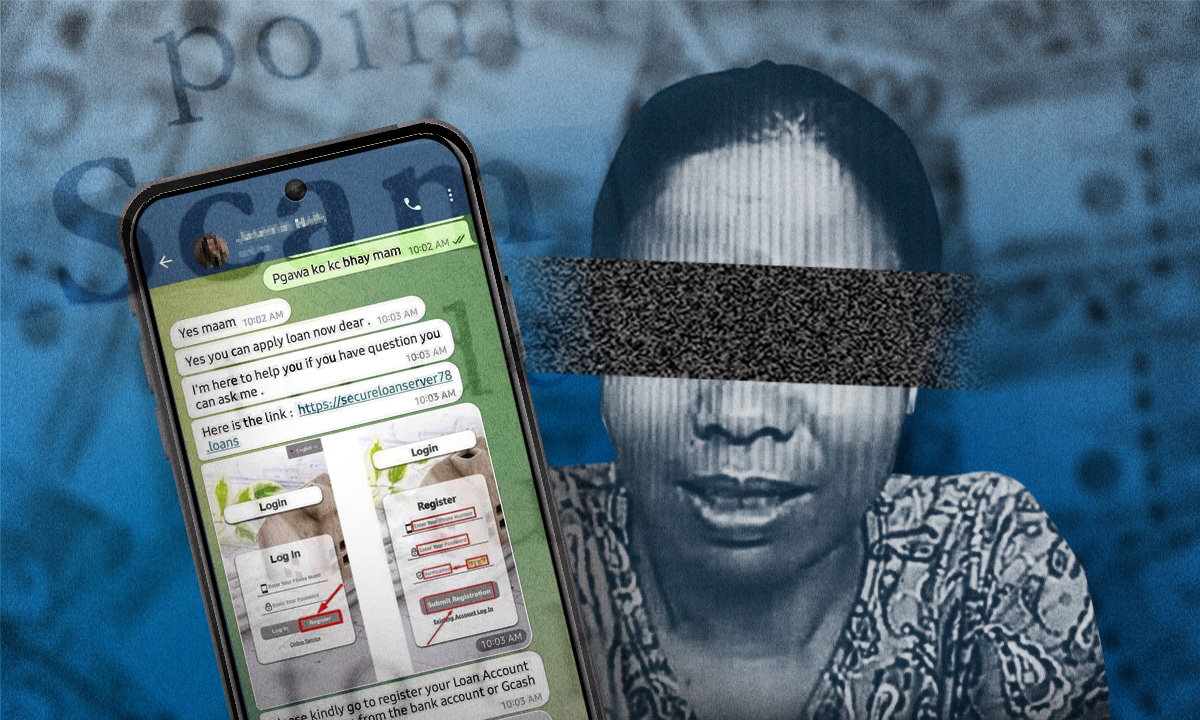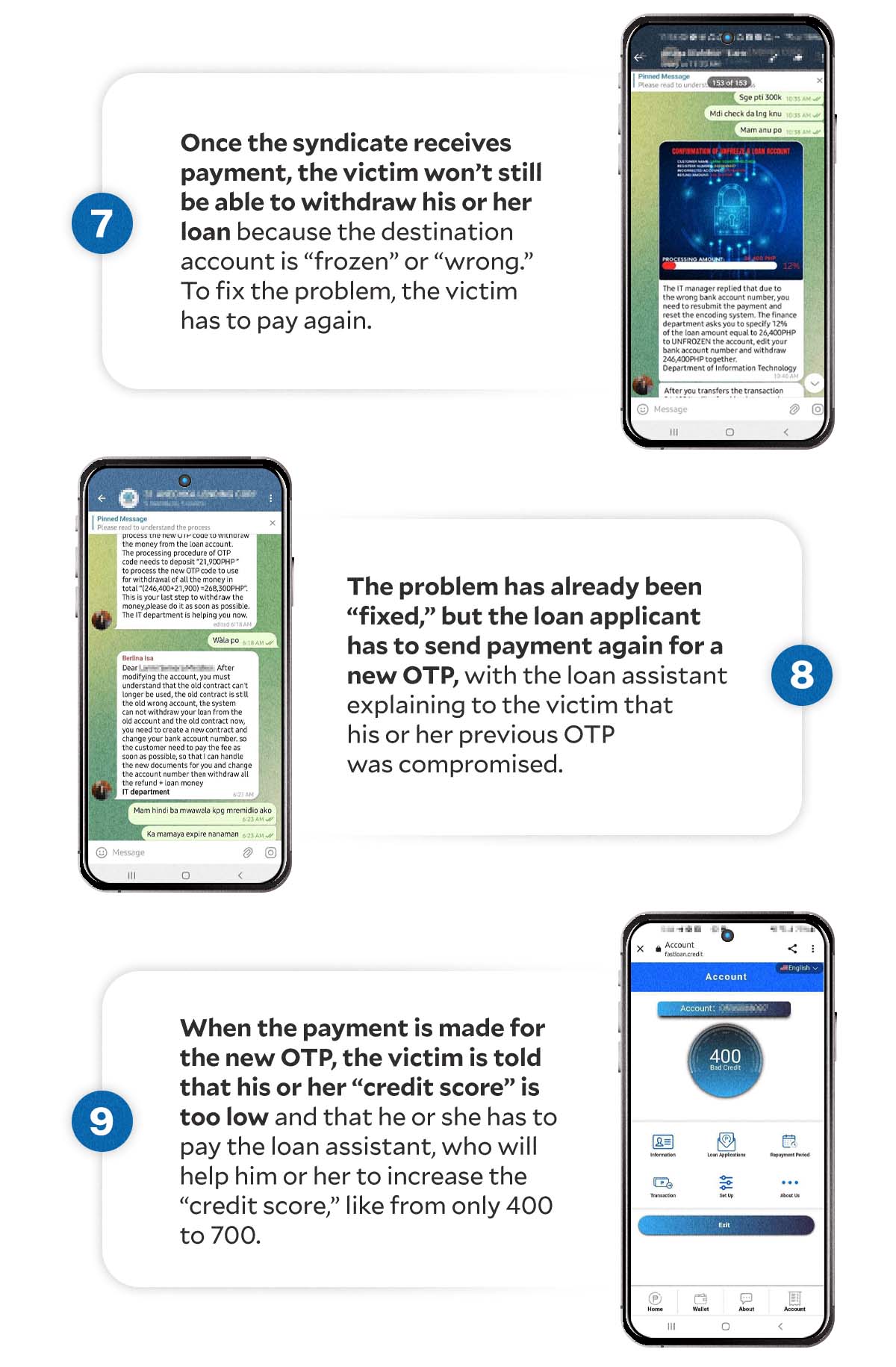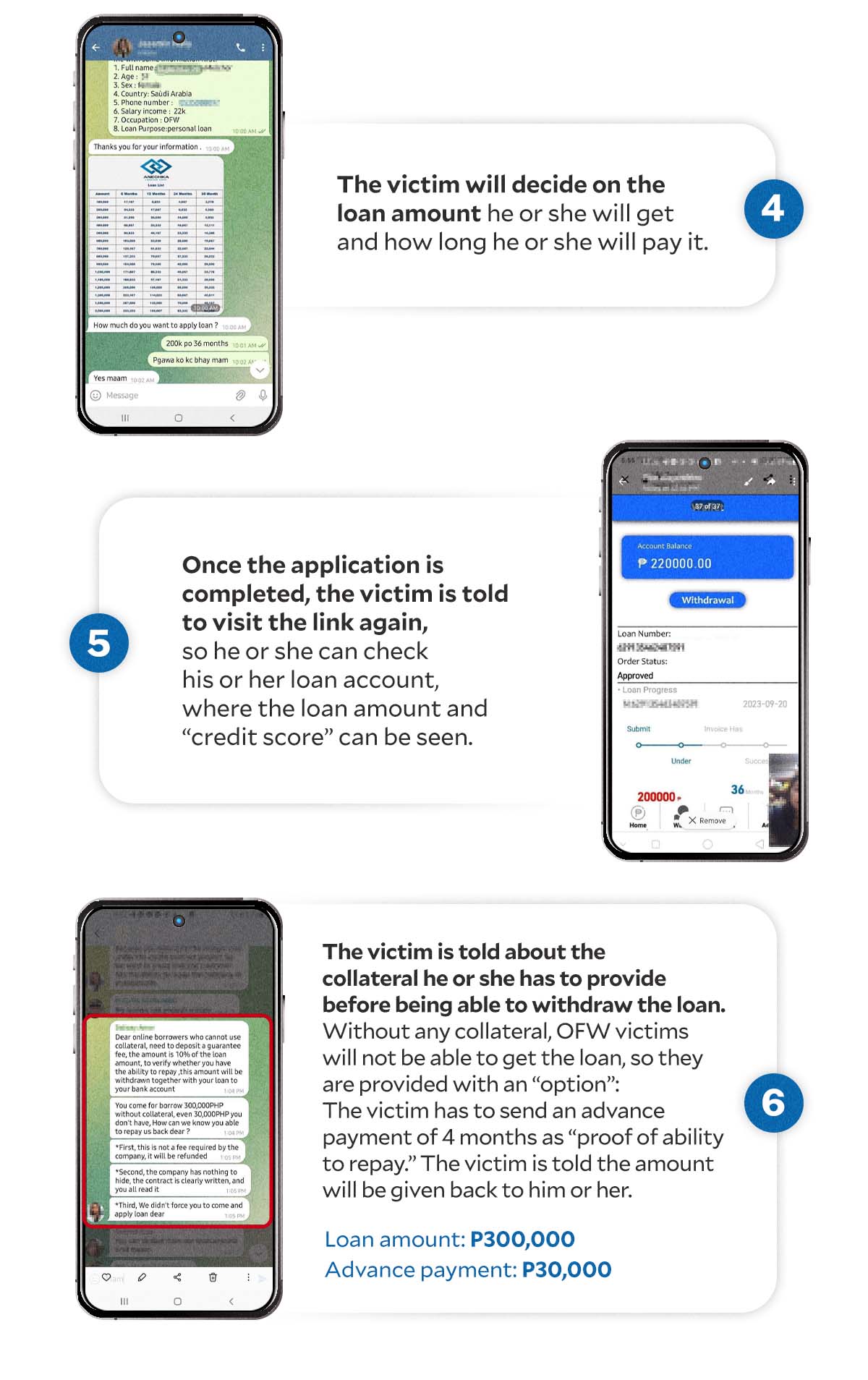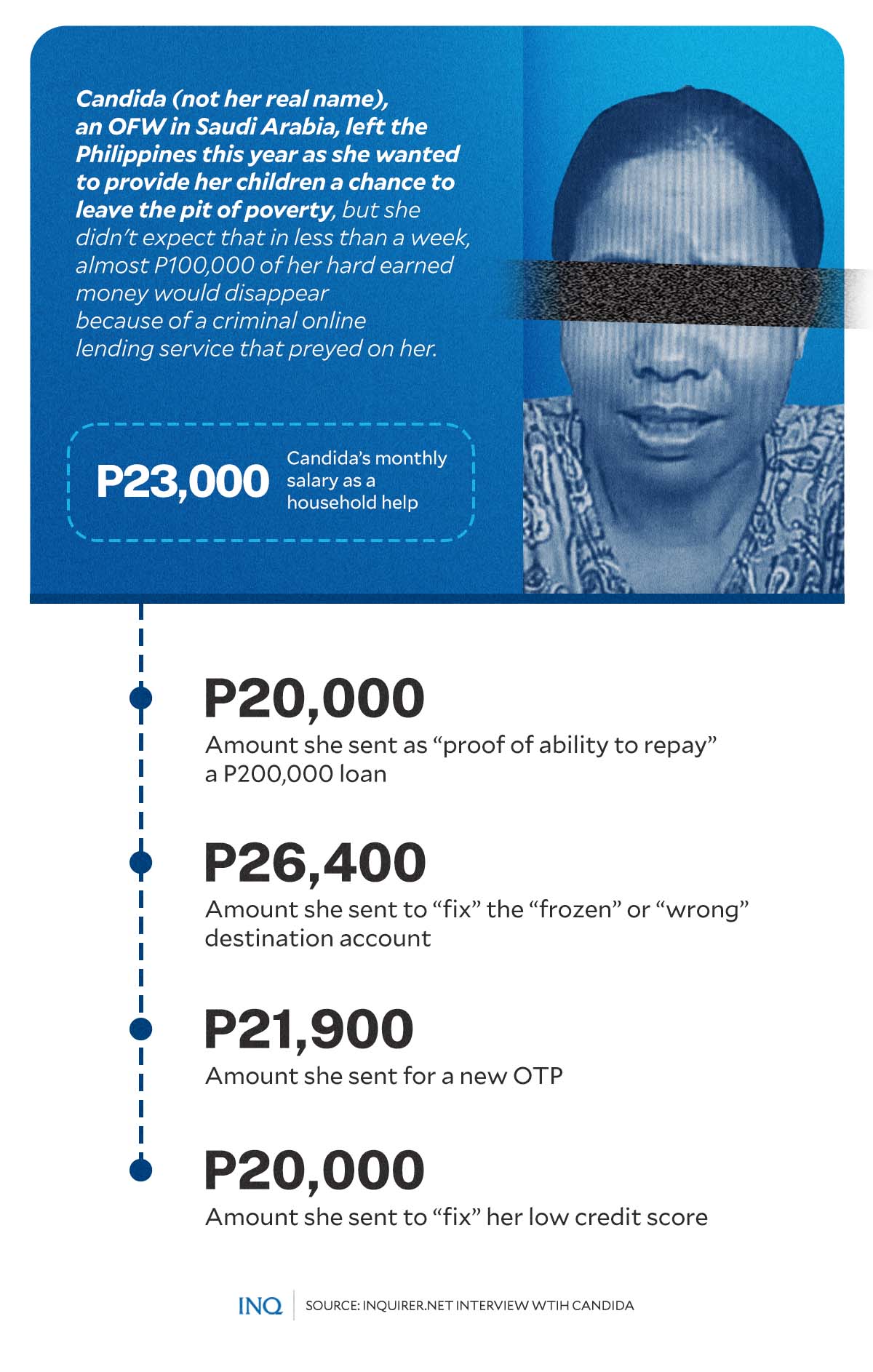OFWs warned vs criminal online lending group thriving on social media platforms

PREYING ON OFWs. A criminal lending syndicate is preying on OFWs, making them believe they provide fast and trouble-free loan application and withdrawal, but instead ask them to send thousands of pesos as “payment”.
MANILA, Philippines—Desperation led a mother to the tough decision to leave the Philippines for overseas work, but her dreams fell apart when she fell victim to a criminal lending syndicate that promised to help her lift her children out of poverty.
Candida (not her real name) eight months ago flew to Saudi Arabia to work as a household help for P23,000 a month. She said she had to be strong despite the struggle of being far from home—for her loved ones, who are relying on her sacrifice.
Last month, however, a nightmare came: Candida lost almost P100,000 to a criminal online loan operator that she thought would give her a chance to have a new start. She was excited as she expected to finally be able to pay her debts back home.
In less than a week, her excitement turned into misery.
“Sabi ko sa nanay ko noong tumawag [siya], magpapakamatay na lang ako kasi ang laking pera niyan (When my mother called, I told her I can no longer take it that I could kill myself because what was lost was really a lot),” she said, stressing the extent of her pain.
Article continues after this advertisementShe pointed out that she was really worried, especially for her children, who will feel the direct impact of the loss. “Gustong makapag-aral ng mga anak ko (My children want to study),” she said of her children—two in college and one in high school.
Article continues after this advertisementCandida said now that she has to save her salary for the next four months to pay back the people she owed money for payments scammed by the criminal online lending syndicate, her children would have to make do with P500 per week, which their father can provide.
“Dati P1,000 ang allowance nila (Before, their allowance was P1,000),” she said.
Deceiving the desperate
She said she was desperate to pay back her debts in the Philippines so she grabbed the chance to borrow from an online lending service that she saw on Facebook, which allows criminal gangs to prosper. When she visited the account, a supposed loan assistant messaged her.
“How can I help you?” Candida was asked. “Nagpapautang ba kayo sa mga OFW (Do you lend money to OFWs)” she replied. When she was told she can obtain a loan, Candida said she will borrow P200,000, which would be payable in 36 months.
“I was expected to pay P6,556 a month,” Candida, who did not finish high school because of poverty, told INQUIRER.net.
As she agreed, Candida was told that they needed to move to Telegram, another online platform that allows crime to thrive, where accomplices, who introduced themselves as loan applicants and OFWs, too, sent messages extolling how they were helped by loans from the online lending syndicate.

GRAPHIC: ED LUSTAN FROM INQUIRER.NET INTERVIEW WITH VICTIM IN SAUDI ARABIA, OFW ACCOUNTS OF THE SCAM IN FACEBOOK POSTS
She said the testimonials, which turned out to be just deception, firmed up her decision.“Parang totoo naman [‘yung mga sinabi nila]. Pinapakita pa, may picture pa na binigyan na sila ng pera (What they had said seemed so true. There were even pictures of them as they received their loan),” she said.
Three days after she first made contact with the criminals, she was told to complete the application process by supplying the required information on the website sent to her. She provided her name, age, contact details, ID cards, photos, and the destination account where the loan would be sent.
As she completed the process, she was asked again about her desired loan amount, so she said she will borrow P200,000. The criminal, pretending to be a loan assistant, told her that the approval of her application won’t take long since her salary is over P20,000.
“Kaya pumunta ako dito kasi marami akong utang diyan [at] gusto kong mabayaran kahit ilang taon ako dito (The reason I decided to work here is because I have a lot of debts back home, so I want to settle them even if it would mean I have to stay here for years),” she said.
Preying on poor
When her application was finally approved, Candida said she was asked to visit the link again so she can check her loan account from the crime group. There, she can see her loan amount and “credit score.”
To receive the loan, however, she has to first hand over “collateral”. But because she did not have documents, like a land title, to give, she was given an option—she had to prove her ability to pay back by sending the criminals an advance payment of P20,000.
Based on screenshots of the conversation that were sent to INQUIRER.net, the supposed loan assistant said online borrowers who cannot give a collateral need to deposit 10 percent of the loan amount “to verify whether you have the ability to repay.”
Candida was assured she will get the P20,000 back, so she borrowed money from a relative to settle the requirement. She sent the amount as a “guarantee fee” on Sept. 23. This was the start of what seemed to be endless bleeding.
She was already excited when her “advance” payment was confirmed, saying she can save some of her loan for the needs of her children. “Wala naman ako sa tabi nila tapos ‘yung tatay nila, nandoon sa bukid (I am not by their side and their father is away farming),” she said.
But she was told she won’t be able to withdraw her loan because the destination account she gave was “wrong”. This led to the “freezing” of her account by the supposed IT department of the criminal online lending group.
RELATED STORY: BI warns jobseekers as human traffickers exploit digital deceptions
She said, though, that she was certain she gave the correct details of her account.
Candida was told she has to send 12 percent of the loan amount, or P26,400, to fix the problem and withdraw P246,000 altogether—the P200,000 loan, the P20,000 “guarantee fee,” and the latest P26,400 she sent on Sept. 25.
‘Fake’
She said she was already told by her relative on Sept. 23 that what she was transacting with is a scam, but the criminal online lending service sent her supposed documents of legitimacy, including one from the Securities and Exchange Commission (SEC).
The supposed loan assistant also told Candida to check the SEC’s list of registered lending companies, and it was there. However, a visit to Facebook Groups about “scam” online lending services showed the same scheme.
But Candida was not aware of any of these, and as she said, “‘Yung P20,000, hindi ko matanggap na na-scam ako kaya nagbayad ako nang nagbayad, nagsend ako nang nag-send ng pera (After sending P20,000, I cannot accept that I was scammed, so I kept on sending).”
She stressed that she held onto the hope that it was only part of the requirements and that eventually, she would be able to get the money back. But she was wrong. The criminals continued preying on her.
Candida said she sent P21,900 again on Sept. 26 for a new One Time Password (OTP) since the old one, she was told, was already compromised as a result of the freezing of her account, then P20,000 to fix her low “credit score.”
This only stopped when she was about to send P10,000 again, as the store, where her relatives were about to send the money, flagged the transaction as a scam and did not proceed with the “cash-in,” patiently explaining how Candida was deceived by “merciless” individuals.
RELATED STORY: Bloodsuckers preying on aspiring OFWs make a killing on placement fees, illegal loans
“Talagang ‘yun na ang iniisip ko. Tatlong araw, limang araw na hindi ako nakakain. Kahit bigyan ako ng madam ko ng pagkain, hindi ako kumakain (I have been thinking of what happened to me. I wasn’t able to eat for days even if my boss was already giving me food to eat),” she said.
All in all, Candida sent P88,300 to the scammers.
Too late
It was too late when Candida realized it was indeed a scam, but this did not prevent her from investigating the scheme. She said she wanted to share what happened to her to warn other overseas Filipino workers.
“Ang hirap magtrabaho dito. Sa akin, kahit hindi na maibalik ‘yung pera kong nawala. Basta para sa mga OFW na naghahangad na makautang, huwag na lang kayong mag-online loan kasi hindi ‘yan totoo,” she said.
(Working here is really hard. For me, I no longer think of what was lost and how to get them back. I only want to warn OFWs who want to make a loan that they should not transact online because those are scam.)
She said a day after realizing that she was scammed, she called the supposed OFWs, who introduced themselves as clients, but to her surprise, the one she talked to was no longer speaking in Filipino, far from his messages in Telegram.
The other, she said, is a male, but was only pretending to be a female.
She said the government should work on preventing these criminal online lending groups from preying on OFWs like her, saying that she was really convinced when she was shown the supposed registration documents of the lender she was transacting with.
INQUIRER.net had already reached out to the Department of Migrant Workers, the Overseas Workers Welfare Administration, and the Philippine National Police but has yet to receive a response.
“Mahirap ang buhay (Life is hard),” Candida said.
RELATED STORY: ‘Kapit sa patalim’: The risks OFWs take in countries even poorer than PH
According to 2010 data from the Episcopal Commission for the Pastoral Care of Migrant and Itinerant People, while the Philippines has millions of OFWs, at least 60 percent of their families remain poor.
If you or someone you know is in need of assistance, please reach out to the National Center for Mental Health (NCMH). Their crisis hotlines are available at 1553 (Luzon-wide landline toll-free), 0917-899-USAP (8727), 0966-351-4518, and 0908-639-2672. For more information, visit their website: (https://doh.gov.ph/NCMH-Crisis-Hotline)
Alternatively, you can contact Hopeline PH at the following numbers: 0917-5584673, 0918-8734673, 88044673. Additional resources are available at ngf-mindstrong.org, or connect with them on Facebook at Hopeline PH.


